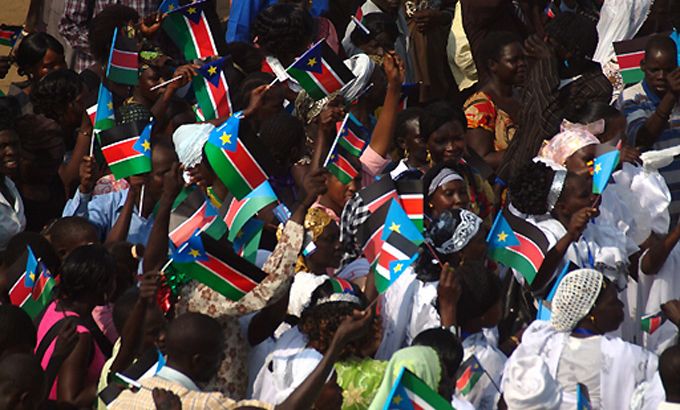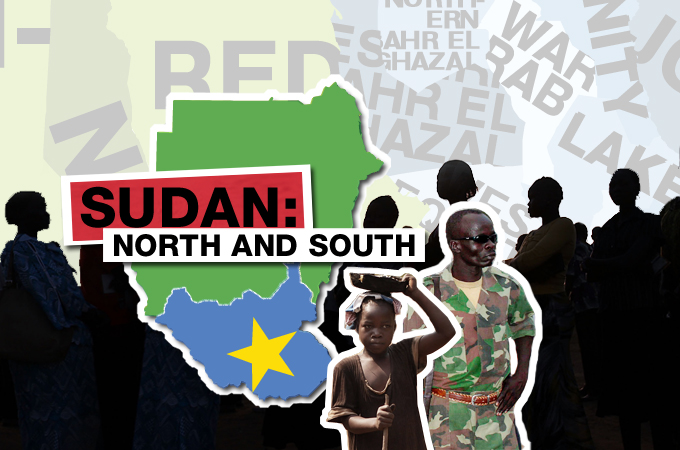South Sudan celebrates ‘new beginning’
New flag raised as crowd of tens of thousands of Sudanese and foreign dignitaries observe birth of a country.

Juba, South Sudan – After decades of war, fought at the cost of millions of lives, and before a crowd of tens of thousands of Sudanese and foreign dignitaries, the world’s newest nation was born in Juba.
To rapturous cries and tears of joy, South Sudan on Saturday became the 193rd country recognised by the United Nations, and also one of the world’s least developed.
Around the mausoleum of John Garang – the longtime leader of the Sudan People’s Liberation Movement (SPLA) – a crowd began to form shortly after daybreak, with thousands of South Sudanese flocking to claim a spot.
A delegation of South Sudanese officials and foreign dignitaries from Zimbabwe to Norway attended the ceremony, which began more than an hour late. After a parade by former SPLA rebels, Speaker James Wani Igga read the proclamation of independence, and the country’s existence became official.
“We have resolved to overcome the past and face the future with a renewed sense of purpose, and it has stirred a forgiveness and reconciliation,” Igga said.
Salva Kiir Mayardit, the president of South Sudan, stood side by side with Omar al-Bashir, his counterpart in the north and a longtime opponent of southern independence.
“We should have a new beginning of tolerance where cultural and ethnic diversity will be a source of pride … Remember we are all South Sudanese first,” Kiir said at a ceremony held in the southern capital to celebrate the country’s independence.
But he also acknowledged: “During the transitional period, the government of South Sudan faces daunting challenges”.
Kiir also offered an amnesty to armed groups fighting his government, and promised to bring peace to troubled border areas.
“I want to assure the people of Abyei, Darfur, Blue Nile and South Kordofan that we have not forgotten you. When you cry, we cry. When you bleed, we bleed. I pledge to you today that we will find a just peace for all,” he said, adding he would work with north Sudan’s Bashir to attain that.
Bashir also spoke at the ceremony, saying: “We congratulate our brothers in the south for the estabishment of their new state … The will of the people of the south has to be respected.”
A roar of approval greeted the raising of the new South Sudanese flag – the former banner of the SPLA – and the country’s bouncing new national anthem quickly echoed out of loudspeakers. The old flag of Sudan will be kept in Juba’s national archives, in recognition of the neighbouring countries’ “common history”.
‘Remember our martyrs. They did not die in vain.’
Some groups at the mausoleum broke into traditional song and dance; others waved the new South Sudanese flag. One man waved a banner proclaiming that independence meant “freedom from slavery”.
| Early arrivers run to claim their spaces at the mausoleum of John Garang [Gregg Carlstrom/Al Jazeera] |
Few in the crowd had seats, or anything to shield them from the scorching sun, but no one seemed to be complaining.
“This is what we fought for!” one man yelled, leading a march of several dozen people into the mausoleum. “Remember our martyrs. They did not die in vain.”
Security was tight at the venue, and indeed in Juba as a whole. Private vehicles have been barred from driving on main roads in the South Sudanese capital, and dozens of police and soldiers have encircled the mausoleum.
Saturday’s ceremony included speeches from visiting dignitaries; a formal lowering of the Sudanese flag and a raising of the South Sudanese one; the first public singing of the southern national anthem; and the signing the transitional constitution by Kiir, the country’s first president.
Ban Ki-moon, the secretary general of the United Nations, also attended Saturday’s ceremony. The UN Security Council on Friday adopted a resolution creating a UN mission in South Sudan that will include 7,000 armed peacekeepers and 900 civilians tasked with helping the fledgling nation.
In a statement, US President Barack Obama said: “Today is a reminder that after the darkness of war, the light of a new dawn is possible. A proud flag flies over Juba and the map of the world has been redrawn.”
China and the UK were among countries which said they had already established embassies in Juba. “We also hope that South Sudan will set up an embassy in Beijing as soon as possible to promote communication,” Chinese special envoy Jiang Weixin said a
‘The beginning of development’
The official ceremony follows a boisterous party on Friday night. South Sudanese poured into the streets shortly before midnight, dancing, beating drums and honking car horns.
 |
“I think you know what this means,” said Joseph Bol, a soldier standing guard at one of Juba’s main intersections. “This is what we fought for. It means not having to live under anyone, it means we decide our own future.”
Independence comes six months after a January referendum in which nearly 99 per cent of South Sudanese voted to separate from the north. The ballot was mandated by the Comprehensive Peace Agreement, the 2005 deal aimed at ending decades of civil war.
Some 2.5 million people were killed during the conflict between southern rebels and the government in Khartoum.
Most South Sudanese say they’re now tired of war and focused on economic development. The new state of South Sudan is one of the poorest and most underdeveloped in the world, but many seem optimistic that independence from the north will mean a better standard of living.
“This [independence] also means the beginning of development for this country,” said Thon Jacob, who celebrated independence at a packed Friday-night worship service at the Emmanuel Church. “Because the resources of the south have always been used for the north. Now the government will be able to develop the south.”
The main resource, of course, is oil: Some three-quarters of the formerly unified Sudan’s oil is located in the south, though all the refinery and shipping facilities are in the north. Khartoum and Juba will likely spend the next few months negotiating a deal to share oil revenues, not to mention the still-undecided details of the border that separates the two countries.
But there was little talk of such politics at the mausoleum on Saturday.
“We are free,” said Helen Joseph, a young woman standing in the crowd next to her mother. “We have only known war. Now we can know peace.”